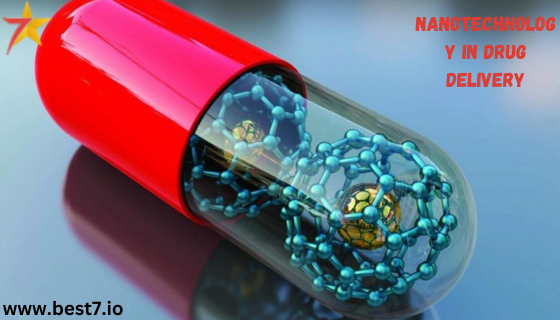
In medicine, nanotechnology is now being regarded as a transformative tool in drug delivery systems due to its rapidly changing environment. This technology has revolutionized the precision, delivery, and administration of treatments for better efficacy and reduced side effects.
The ability of healthcare professionals to utilize nanoparticles as therapeutic carriers demonstrates the power of nanotechnologies in high-precision medicine and provides better patient results.
Nanoscale Engineering in Drug Delivery: A Concept
Nanotechnology is extremely broad, encompassing the manipulation of materials at lengths between 1 and 100 nanometers, while biochemical issues involve much smaller molecules. One of the most exciting areas is in drug delivery, where nanotechnology has made it possible to create nanoparticles programmed to carry drugs directly to specific locations within the body. This method has addressed numerous issues found in traditional forms of drug delivery.
The Growing Market for Nanotechnology in Drug Delivery
Research shows that the global market for nanotechnology in drug delivery is expected to reach a value of around USD 29.9 billion by 2025, reflecting its rising importance.
This breakthrough in healthcare innovation enables the creation of nanoparticles (also known as nanomedicines) designed for precise targeting and delivery of therapeutic agents, making therapies more targeted.
Targeted Therapies: Enhanced Efficacy and Precision
The major benefit of using nanotechnology in medicine is the development of targeted therapies. Traditional drug delivery methods often create generalized systemic effects, leading to adverse events and limited therapeutic potential. Fortunately, nanocarriers enable the direct delivery of drugs to the specific site of action.
Application in Cancer Treatment: Improving Outcomes with Nanocarriers
Chemotherapeutic agents, such as anticancer drugs, have been encapsulated in nanoparticles to enhance targeted cancer treatments. Research published in the Journal of Controlled Release demonstrated that nanoparticles can deliver drugs directly to tumors, significantly increasing absorption by cancer cells compared to traditional methods. This targeted approach improves treatment efficacy and reduces required dosages, thereby minimizing side effects.
Controlled Release Mechanisms for Sustained Treatment
Precision-controlled drug delivery has also been enabled by nanotechnology, allowing for the gradual and sustained release of drugs over time. This is particularly beneficial for patients with chronic diseases who require consistent therapeutic drug levels.
Studies published in the American Journal of Pharmaceutical Sciences suggest that nanocarrier-based formulations improve drug retention by 60% compared to conventional methods, aiding in better patient compliance and reducing dosing frequency.
Advancing Precision Medicine Through Nanotechnology
Nanotechnology in drug delivery aligns seamlessly with the Precision Medicine paradigm, which tailors treatments to individual genetic profiles. With nanotechnology, particles can be engineered to respond to biological stimuli (such as pH or temperature), enabling healthcare providers to optimize drug compositions for enhanced effects.
Enhancing Drug Absorption for Poorly Soluble Compounds
Improving the bioavailability of poorly soluble compounds has long been a challenge in drug delivery. Nanotechnology addresses this by reducing particle size and increasing surface area, enhancing drug absorption.
Research in the European Journal of Pharmaceutics and Biopharmaceutics demonstrated that nanoparticles improve solubility and absorption of certain drugs by three to fourfold, decreasing dosages while increasing therapeutic efficacy and safety.
Broadening Biomedical Applications
The application of nanotechnology in drug delivery extends beyond cancer treatment to other therapeutic areas. For instance, bolus carriers have been used to deliver vaccines, creating localized immune responses that increase vaccine efficacy.
The COVID-19 pandemic highlighted the potential of nanotechnology, as seen in mRNA vaccines like Pfizer-BioNTech and Moderna, where lipid nanoparticles were critical for delivering genetic material into cells effectively.
Enhancing Immune Response Through Targeted Drug Delivery
Nanotechnology also holds promise in enhancing immune responses. Research in Advanced Drug Delivery Reviews found that the targeted delivery of immunomodulatory drugs with nanoparticles can improve therapeutic efficacy by up to 50%. This application emphasizes the potential of nanotechnology in treating autoimmune diseases and allergies through precision-targeted interventions.
Future Prospects for Nanotechnology in Drug Delivery
The future of drug delivery with nanotechnology is promising, with potential advancements in materials, such as biocompatible polymers and advanced hydrogels. The integration of AI and machine learning in nanocarrier development can further enhance personalized medicine by identifying optimal nanoparticle designs for specific patient needs.
Navigating Regulatory and Ethical Challenges
Despite its potential, nanotechnology in drug delivery faces regulatory and ethical challenges. Rigorous testing and evaluation of nanomedicines are necessary, and agencies like the FDA need to establish guidelines to streamline development and approval.
Additionally, ethical considerations, such as patient consent and data privacy, must be addressed to ensure patient safety.
A New Era of Targeted Treatments and Improved Patient Outcomes
Nanotechnology is transforming drug delivery, offering targeted treatments that promise better patient outcomes. As advancements continue, the field is expected to deliver innovative healthcare solutions, shaping the future of medicine.












